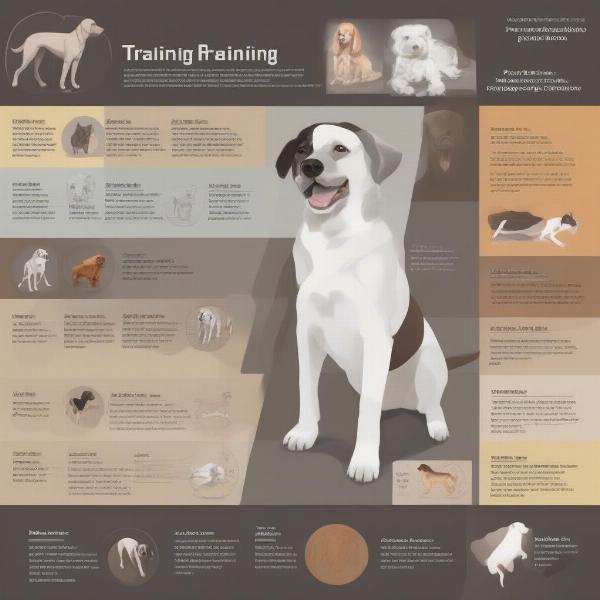Dog training apprenticeships offer an exciting pathway to a fulfilling career working with canines. Whether you’re a novice or have some experience with dogs, an apprenticeship can provide the hands-on training and mentorship necessary to become a skilled dog trainer. This guide will explore the various aspects of dog training apprenticeships, from finding the right program to essential skills and career prospects.
Finding the Right Dog Training Apprenticeship
The first step is identifying a reputable program that aligns with your goals. Look for apprenticeships that emphasize positive reinforcement methods, focus on ethical training practices, and offer a comprehensive curriculum. Consider factors like program duration, mentorship opportunities, and the types of dogs you’ll be working with. Some apprenticeships specialize in specific areas like obedience, agility, or service dog training.
Key Considerations when Choosing an Apprenticeship:
- Certification and Accreditation: Check if the program is certified by a recognized organization, which ensures quality and credibility.
- Mentor Experience: Research the experience and expertise of the mentors who will be guiding you. Their knowledge and teaching style will significantly impact your learning.
- Practical Training: A strong apprenticeship should provide ample opportunities for hands-on training with a variety of dogs.
- Curriculum: Review the curriculum to ensure it covers essential topics like canine behavior, learning theory, and training techniques.
 Dog Training Apprenticeship Curriculum
Dog Training Apprenticeship Curriculum
Essential Skills for a Dog Training Apprentice
Beyond a passion for dogs, a successful apprentice needs a specific set of skills. Patience, empathy, and good communication are crucial for building a positive relationship with dogs and their owners. Observation skills are essential for understanding canine body language and identifying potential behavioral issues. Physical stamina is also important, as the job can be physically demanding.
Building Your Skillset:
- Active Listening: Paying close attention to both the dog and the owner is crucial for effective training.
- Adaptability: Every dog is unique, and an apprentice must be able to adapt their training approach accordingly.
- Problem-Solving: Identifying and addressing behavioral issues requires strong problem-solving skills.
Career Prospects after an Apprenticeship
Completing a dog training apprenticeship opens doors to various career paths. You can work as an independent dog trainer, join a dog training school, or specialize in a niche area like service dog training or canine behavior modification. The demand for skilled dog trainers is growing, making it a promising career choice.
Exploring Career Options:
- Dog Daycare and Boarding Facilities: Many facilities employ trained professionals to manage dog behavior and provide enrichment activities.
- Animal Shelters and Rescues: Training skills are highly valued in shelter environments to help dogs become more adoptable.
- Specialized Training: Pursuing further certifications in areas like agility, scent work, or therapy dog training can expand your career opportunities.
Conclusion
A dog training apprenticeship is a rewarding journey for anyone passionate about working with dogs. By choosing the right program, developing essential skills, and exploring diverse career paths, you can embark on a fulfilling career helping dogs and their owners build strong, positive relationships. Finding a reputable apprenticeship is the key to unlocking your potential as a skilled dog trainer. Begin your search today and take the first step towards a rewarding career.
FAQs
-
How long does a typical dog training apprenticeship last? Apprenticeship durations vary, typically ranging from six months to two years.
-
Do I need prior experience to apply for a dog training apprenticeship? While prior experience can be helpful, many programs accept individuals with a genuine passion for dogs and a willingness to learn.
-
What is the average salary for a dog trainer? Salaries vary based on experience, location, and specialization. Entry-level trainers can expect a starting salary around $30,000 per year, while experienced trainers can earn significantly more. how to stop dog barking at other dogs
-
What are the different types of dog training specializations? Specializations include obedience training, agility training, service dog training, therapy dog training, and canine behavior modification.
-
Is certification necessary to become a dog trainer? While not always legally required, certification demonstrates professionalism and can enhance career opportunities. dog collar for blind dogs
ILM Dog is a leading international online resource dedicated to providing expert advice and valuable insights on all aspects of dog care and training. We cover a wide range of topics, from breed selection and health to nutrition, behavior, and training techniques. Whether you’re a new dog owner or a seasoned expert, ILM Dog offers comprehensive information to help you provide the best possible care for your canine companion. For expert advice and resources, contact us via email at [email protected] or phone at +44 20-3965-8624. For more valuable resources, visit ILM Dog today.